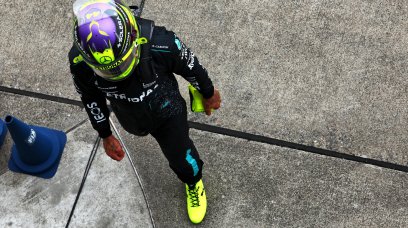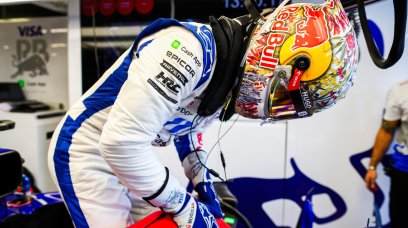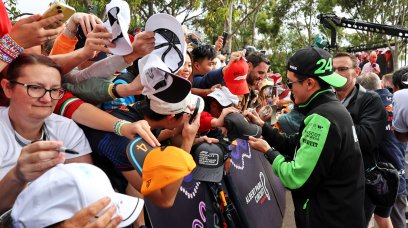In recent times, Formula 1 appears to have developed an increased sense of responsibility when it comes to acknowledging wider issues in the world. The sport now integrates itself into addressing these concerns rather than avoiding them; the recent We Race As One initiative is evidence of this, with the 2021 campaign focused on the three pillars of diversity and inclusion, sustainability and community. Perhaps in line with this, the global conversation surrounding mental health has now started to open up in F1 in a way that was previously unheard of. In past eras, it was rare for a key figure in Formula 1 to openly discuss anything related to this topic. If a driver, for example, did choose to speak out then this would usually happen after their career in the sport was over, or was very much nearing its end. On some occasions, these revelations also came with a worrying sense of being brushed off as a sacrifice made in pursuing the dream of becoming a racing driver. David Coulthard wrote in his 2007 autobiography about experiencing the eating disorder bulimia during the early days of his career as he tried to break into F1. The Scotsman cited the need to keep his weight down for racing as being one of the causes of his condition. Yet concerningly, this revelation did not appear to prompt a deeper discussion about its problematic nature; at the time, Coulthard suggested his behaviour was driven by the desire to succeed, perhaps unwisely adding to the misconception that eating disorders are a choice. Nico Rosberg also spoke after his retirement of his decision to seek the support of a sports psychologist during his time as an F1 driver. The 2016 world champion said that this proved particularly valuable in his title fight with teammate Lewis Hamilton, as well as having a positive impact on other areas of his life.
Talking about mental health post-F1 should not be undervalued; deciding to speak out at all about a personal matter is a brave decision. But it feels like a shame that some may have suffered with difficulties during the height of their career and felt unable to talk about it at the time. So why does this happen? There could be numerous reasons for the silence and clearly it would not be fair to speak on anybody's behalf. Yet it could easily be imagined that the fear of being seen as 'weak' - especially in such a male-dominated category where the concept of some sort of 'alpha' male may exist - might be a factor, even though this is an outdated, incorrect and potentially harmful idea. Another issue could perhaps be the concern of repercussions in their career, or maybe the worry of being accused of not appreciating their privilege. A common misunderstanding in the conversation surrounding mental health is that being fortunate in life somehow negates the suffering. This is quite obviously not the case; mental illness does not discriminate and can affect anyone, regardless of wealth, career, etc. With this kind of stigma and misunderstanding having been around for some time, it is sadly easy to see why some have not felt comfortable with speaking out in the past. So the fact that several current F1 drivers are now publicly discussing mental health is a sign of how the conversation is shifting - albeit slowly - from one of seeming discomfort and misconception to one of openness and understanding.
An interesting aspect of this is the fact that those who are speaking out appear to be reaping the benefits on track as well as off. George Russell recently spoke of how he sought support from a psychologist to enable him to better cope with disappointments, such as the loss of what looked to be an almost certain first win when he substituted for Lewis Hamilton at Mercedes in the 2020 Sakhir Grand Prix. "I’m feeling stronger and stronger about this, the more time goes on and since I’ve also had these difficult moments and learnt that talking about it to the right person," Russell told The i. "Obviously talking to your family and friends is all well and good but getting professional advice was really important. "That allowed me to come back stronger, fitter, healthier than ever, and [I’ll] be able to perform off the back of it." Fast forward to the 2021 Emilia Romagna Grand Prix, where Russell became a key talking point following his furious reaction to a crash with Valtteri Bottas. Within a matter of days, the Briton issued an apology for his behaviour and comments to Bottas as well as his fans. This approach showed a level of maturity and an ability to deal with disappointment and controversy in a level-headed way. Arguably, the training Russell spoke about receiving for his mental health surely came into play here. On the track, Russell soon bounced back and had a particularly good weekend at the Spanish Grand Prix. Whilst a strong result can be hard to come by in the Williams, the 23-year-old enthused about how much he enjoyed driving the car and spoke of the positives he had taken from the race. Again, evidence of mentally knowing how to come back from a difficult moment.
Lando Norris is another driver to contribute to the discussion surrounding mental wellbeing. The McLaren driver has talked about struggling with anxiety and self-belief during his first season in F1, and revealed how working with a mind coach enabled him to then feel equipped enough to look after his mental health going forwards. Since then, Norris has gone from strength to strength on the track. The Briton has been one of the stand-out drivers of 2021 so far, having outperformed new teammate Daniel Ricciardo at most races. This comes at a time where there appears to be a similar trend amongst young athletes in other disciplines. MotoGP rider Fabio Quartararo, for example, is on a resurgence after being open about seeing a sports psychologist over the winter due to his struggles with the pressure of leading the title last year. Yet it is not just the younger generation who are contributing to this vital conversation. Lewis Hamilton has spoken about his own struggles with mental health, and often speaks candidly about various topics on social media. The fact that a seven-times world champion - and on paper probably the sport's most successful driver ever, and yet again looking stronger than ever on track - has faced issues is perhaps the strongest piece of evidence that speaking out about mental wellbeing is no weakness. Quite the opposite.
It is worth considering how investing in mental health could help drivers in the future too. Whilst the prospect of post-F1 life is years away for some, having had that prior support may be beneficial when making the transition away from the grid and into new ventures. Romain Grosjean was one of the few drivers in the past to talk openly about seeing a sports psychologist during his Formula 1 career, long before his horrific accident at the 2020 Bahrain Grand Prix. Yet the Frenchman has since said that continuing to seek this support in the wake of the crash was helpful in allowing him to mentally recover from the trauma and to avoid potentially facing flashbacks. Perhaps this helped Grosjean in not being put off from continuing his racing career after the accident brought an end to his time in F1, with the former Haas racer having recently secured his first pole position in IndyCar. So the evidence is clear for how seeking support for mental health can have benefits for the individual, both on and off the track. But as well as this, it is also encouraging to think about how those who speak out could be positively influencing others. Gaining enjoyment from following a sport like Formula 1 is arguably good for mental wellbeing in itself; a moving example of this recently came from a Kimi Raikkonen fan, who spoke in a video message to the Finn about how watching his 2007 title challenge had helped keep his spirits up during a difficult time.
View this post on Instagram A post shared by FORMULA 1® (@f1)
Yet to have key figures in the sport talking directly about mental health and voicing their relatable experiences could be incredibly powerful in encouraging others to talk and seek support. Seeing people in the public eye discuss such matters is important and is perhaps even more vital in a sport such as Formula 1, given the demographic of potentially being able to reach a male audience. Statistics have often shown that men - particularly younger men - are more likely to die by suicide than women, and suicide has been cited as one of the leading causes of death amongst men under 50. With men often more likely to suffer in silence, the effect of seeing a male athlete like Russell or Norris speak out could be profound. Norris himself recently spoke of the reaction to his decision to talk. "I was getting messages from people saying how I'd impacted them," the Briton told ESPN. "And how me being me... how I'd changed their lives or, I guess as deep as saying, they were thinking about suicide and stuff like that, saying how I'd had an impact on changing that. Saying they're enjoying their lives a lot more. "Seeing a lot of those messages and learning about that made me realise I can use my platform a lot more to speak up about it because it's things I've struggled with in the past, and [it's about] knowing and learning how much of a difference I can have on people around the world." Similarly Russell has spoken about the need to address this issue amongst men. "I think so many people, men particularly, see psychology as a weakness, which is absolutely not the case. Your mind is the most powerful tool in your body. "I was never one of these people who thought mental health is not that important and you’re either mentally strong or mentally weak or whatever and you just got to be strong about it if you’ve ever had a difficult moment, toughen up and get through it."
Arguably the earlier that this message reaches young people the better and, with many children and teenagers looking up to Formula 1 stars, this could be vital in enabling them to grow up with a better understanding of how to manage their mental wellbeing. Speaking out about mental health is of course a personal decision, and nobody should be forced to do so if they are not comfortable. Admittedly, there are certain figures in the sport who it is hard to envisage would ever talk openly about such matters. Those who do, though, are not only reaping the benefits on the track and in their personal lives, but are also helping others in ways we may not even be fully aware of.
Most read






















